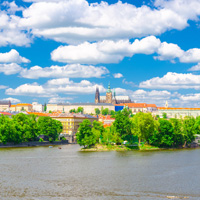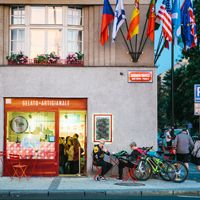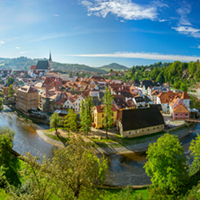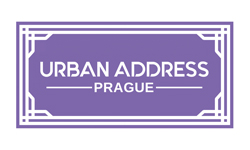Czech Rep
The Czech Republic, also known as Czechia, is a landlocked country in Central Europe bordered by Germany to the west, Austria to the south, Slovakia to the east, and Poland to the northeast. Prague, the capital, is known for its beautiful architecture, historical ambiance, and vibrant cultural scene. The country boasts a rich history, with medieval towns, castle ruins, and diverse landscapes that range from the rolling hills of Bohemia to the rugged mountains of Moravia. The Czech Republic has a strong industrial tradition, a high-quality education system, and a robust healthcare system. It is also famous for its beer, with a brewing tradition that dates back centuries. The country's economy is well-developed, with machinery, automobiles, and electronics among its main exports. The Czech Republic is a member of the European Union, NATO, and the OECD, reflecting its integration into Western economic and security organizations. The cultural heritage of the Czech Republic is rich and varied, with UNESCO World Heritage Sites such as the historic center of Prague, Cesky Krumlov, and Kutna Hora. The country's traditions and festivals, such as the Prague Spring International Music Festival and the Karlovy Vary International Film Festival, attract visitors from around the world. Despite its relatively small size, the Czech Republic has made significant contributions to the fields of science, literature, and music, with notable figures including the composers Antonin Dvorak and Bedrich Smetana, the writers Franz Kafka and Milan Kundera, and the scientist Gregor Mendel. The Czech landscape is also a draw for outdoor enthusiasts, with opportunities for hiking, skiing, and cycling. The country's national parks, such as Sumava and Krkonose, offer stunning natural beauty and biodiversity. Overall, the Czech Republic is a country with a deep historical footprint, a lively cultural scene, and a modern outlook, making it an attractive destination for tourists and expatriates alike.
 Urban Address Prague
Urban Address PragueConnect
Urban Address Prague is a bespoke boutique one-stop-shop solution for your property needs in Prague and the Czech Republic. We don't just find you the perfect apartment, we build your Prague dream. And what's more - we can arrange everything remotely, stress-free. We are your partner to help you make Prague your new home.
Click connect to have our partner contact you via e-mail and/or phone.
 Urban Address Prague
Urban Address PragueUrban Address Prague is a bespoke boutique one-stop-shop solution for your property needs in Prague and the Czech Republic. We don't just find you the perfect apartment, we build your Prague dream. And what's more - we can arrange everything remotely, stress-free. We are your partner to help you make Prague your new home.
Connect
Click connect to have our partner contact you via e-mail and/or phone.
Living in Czech Rep
Best Places to Live in Czech Rep
Visa & Residency
Obtaining a residency in the Czech Republic involves several steps and can be moderately challenging, depending on the applicant's circumstances and the type of visa they are applying for. The most common types of residency visas are the Long-term Residence Permit and the Employee Card. The Long-term Residence Permit is suitable for those who have a family member in the Czech Republic, plan to study, or have other long-term interests in the country. The Employee Card is a dual permit for both residing and working in the Czech Republic, specifically for those who have found employment there. The process typically begins with the applicant gathering the necessary documents, which may include a passport, proof of accommodation, a criminal record check, proof of funds, and a medical insurance policy. For the Employee Card, an employment contract or job offer is also required. Applicants must then submit their application to the Ministry of the Interior of the Czech Republic, either through a Czech Embassy or Consulate in their home country or, in some cases, within the Czech Republic itself. Once the application is submitted, it is reviewed by the authorities. This process can take several months, and applicants may be required to attend an interview. If approved, the applicant will receive a visa for entry into the Czech Republic, where they must then register with the Foreign Police within three working days of arrival. For digital nomads, the Czech Republic offers a Long-term Visa for the Purpose of Other, which is intended for those who wish to live in the country for reasons not explicitly covered by other visa categories. This visa can be a good option for digital nomads, as it allows them to reside in the Czech Republic for up to one year. The application process for this visa is similar to that of other long-term visas, requiring documentation such as proof of accommodation and sufficient funds. Overall, while the process can be bureaucratic and time-consuming, it is generally considered to be of average difficulty compared to other countries. It is highly recommended that applicants start the process well in advance of their intended move date and consider seeking assistance from a legal professional or visa agency to navigate the complexities of the Czech immigration system.
Healthcare in Czech Rep
The Czech Republic has a universal public healthcare system that is mandatory for all residents, including expatriates who have registered for long-term or permanent residence. The system is funded by compulsory health insurance contributions, with the state covering the insurance of certain groups, such as children, students, and pensioners. Public healthcare provides a wide range of services, from general practitioners to specialized treatments, at a relatively low cost. Private healthcare is also available and offers faster access and more comfortable conditions, but at a higher cost. Quality in both public and private sectors is generally high, though public facilities may face longer waiting times. Expats and digital nomads can access public healthcare once they have registered for public health insurance, which typically requires a work permit or long-term residence permit.
Cost of Living
The cost of living in the Czech Republic is considered moderate when compared to other European countries. Essentials such as food, public transportation, and housing are reasonably priced, although prices can be higher in the capital city of Prague.
Weather
The Czech Republic has a temperate continental climate with warm summers and cold, cloudy, and snowy winters. The temperature varies greatly depending on the season, with summer temperatures often reaching the high 20s Celsius, while in winter, it can drop well below freezing. Spring and autumn are generally mild but can be unpredictable with varying conditions and temperatures.
Educational System in Czech Rep
The educational system in the Czech Republic is known for its high quality and is structured into several stages. Education is compulsory from the age of 6 to 15. It begins with preschool education, which is optional, followed by nine years of elementary education, divided into two stages: the first stage for children aged 6 to 11 and the second stage for children aged 11 to 15. After completing elementary education, students can choose to attend either a general secondary school, which prepares them for higher education and lasts for four years, or a vocational secondary school, which focuses on practical skills and can last from two to five years, depending on the qualification. The Czech Republic also has a unique system of secondary education known as the "gymnasium," which lasts for either four or eight years and provides a comprehensive education with a focus on preparing students for university. The school year runs from September to June and is divided into two semesters. The grading system uses a scale from 1 (excellent) to 5 (fail). Higher education is accessible to those who pass the "maturita" exam at the end of their secondary education. The Czech Republic offers a variety of educational programs, including bilingual and international schools, which may be particularly appealing to expatriate families.
Universities in Czech Rep
The university system in the Czech Republic is part of the European Higher Education Area and follows the Bologna Process, which standardizes higher education across Europe. Universities in the Czech Republic offer three main types of degrees: Bachelor's (typically three years), Master's (two years following a Bachelor's or five to six years as a long-cycle Master's), and Doctoral (usually three to four years after a Master's). The academic year is divided into winter and summer semesters, with exams at the end of each semester. The Czech Republic has both public and private universities, with the majority of higher education institutions being public. Public universities do not charge tuition fees for programs taught in Czech, while programs in English or other foreign languages may have tuition fees. Private universities, on the other hand, charge tuition fees for all their programs. The cost of university education for foreign students can vary widely depending on the institution and program of study. Living costs in the Czech Republic are generally reasonable compared to other European countries. Foreign students often need to demonstrate proficiency in the language of instruction and may need to pass an entrance exam. The Czech Republic offers a range of programs in various fields, and its universities are well-regarded, particularly in disciplines such as engineering, medicine, and the sciences.
Copyright 1997-2025 Burlingame Interactive, Inc.

















